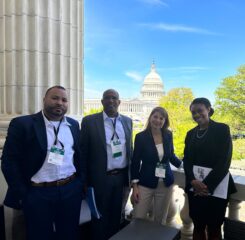Survey Review – How Persons of High Net Worth View Retirement
Survey questions from the Savant Wealth/ Absolute Engagement report specifically targeted respondents’ views on the timing of retirement, the impact of the COVID pandemic on retirement plans, and how people envisioned their retirement years. The report identified six “key takeaways,” which are listed and then summarized, below.
· How high-net-worth people envision retirement is changing.
· Retirement plans changes because of the pandemic.
· The vision for retirement should be meaningful and purposeful.
· Retirement does not necessarily mean the cessation of full-time work.
· High-net-worth people plan to “retire” earlier.
· Some may choose to retire earlier if they had a clear vision of what to do next.
The Changing Vision of Retirement
Overall, 54% survey participants indicated they had a traditional view of retirement; that is, to fully stop any form of paid or unpaid work. The remaining 46% said they would either transition to part time or volunteer work. Where the interesting data emerge is when we take a closer look at gender and age disparities in the responses. Women were more likely to transition to part time or volunteer work (54% of women as compared to 41% of men); younger people (under the age of 55) were more likely to envision a ‘traditional’ full-stop view of retirement, whereas older people (age 55+) were more likely to envision a transitional path to retirement. When asked what barriers prevented respondents from planning for a transitional path to retirement, the predominant responses were fears over a loss of income (52%,) fear of trying something new (42%,) and fear of losing health insurance (28%). Most promisingly, 69% of all participants said that, if they thought it was a viable option, they would be willing to ‘work on their own terms’ and/or try something new in retirement.
The Pandemic Effect on Retirement
Not surprisingly, the age of the survey participant was a key factor in whether the pandemic affected their plans for retirement. Forty-two percent of those under the age of 45 said that the pandemic had changed their retirement plans, as compared to 0% of those over the age of 75. Conversely, 83% of those over the age of 75 said the pandemic had not changed their plans, as compared to 57% of those under the age of 45.
Of those that had changed retirement plans due to the pandemic, those under the age of 45, and those between the ages of 65-74 were most likely to say they would ‘have to work longer than planned.’ Those aged 45-54 said the opposite; the pandemic has made them wish to retire earlier than planned. And, as the age of a person increased, they were more likely to say that the pandemic had made them ‘want to spend their time differently than planned’ in retirement. Men were more likely than women to say they had to work longer than planned and wanted to spend their time differently than planned.
Meaningful, Purposeful Retirement Planning
The third “key takeaway” evaluated “false start” or “failed retirements;” specifically, the data shed some light on those who had retired but chose to return to work. While only 19% of all survey respondents fell into this category, there were a few interesting trends worth noting. The predominant reasons people did return to work are as follows*:
· Financially, but not personally, ready (36%)
· Could not move on from full time work (34%)
· Felt unfulfilled (28%)
· Too much free time (27%)
· Did not feel a sense of purpose (26%)
Women were more likely than men to feel they could not cease full time work or had too much free time; men were more likely to feel personally not ready, unfulfilled or without a sense of purpose. (*Note: Participants could select more than one answer.)
Concerns that people have about the future of their retirement were also explored by the survey. Participants reported that their greatest future concerns about retirement were as follows:
· Worried I’ll lose my identity (48%)
· Worried I won’t have a sense of purpose (40%)
· Hard to imagine not working full time (38%)
· Not sure what to do with my time (34%)
· Worried I can’t afford my lifestyle (33%)
Additionally, most respondents felt ‘very clear’ (40%) or ‘clear’ (33%) about how they want to spend their retirement, and most reported very positive feelings about retirement, including ‘hopeful‘ (47%,) relaxing’ (42%,) and ‘optimistic’ (41%.)
Working and “Retirement”
Briefly, the survey examined the language that people across the age groups use to describe the cessation of full-time work, which is how ‘retirement’ is traditionally defined. Not surprisingly, overall, 60% of all participants thought that the word “retirement” aptly describes the phase of life where one stops working full time. However, there was some interesting gradient detail in this semantic analysis by age group. As the age of the person increased, they were more likely to use “retirement” in the traditional sense; the next most-favored terminology was “The Next Chapter,” which was more favored by those between the ages of 45-54. Only those under the age of 45 showed some preference (13%) for “The Encore Career,” and marginally across all ages, “The Second Act” had some favorability.
Earl(ier) Retirement Planning
Most people who participated in the survey expressed a wish to retire between the ages of 60-64 (26%) or 65-69 (24%). When asked what barriers existed that prevented them from retiring before the age of 60, respondents said these were the greatest reasons:
· I want to keep working full time (37%)
· Lack of financial resources (35%)
· I don’t know what to do with my time (17%)
· Personal fears (16%)
Women were more likely than men to cite lack of financial resources as the reason to wait until after age 60 to retire; men were more likely to say they did not know what to do with their time, or to cite personal fears. Strikingly, those aged 75+ predominantly stated they simply did not want to stop working full time (75% of that cohort); as the age of the person decreased, they were more likely to give “lack of financial resources” as the reason to delay retirement. Also, those under the age of 45 said that they “worried what people would think” if they retired early (24%,) or that their family did not want them to stop working full time (19%.)
A Clear Vision = An Earlier Retirement
Finally, the survey reviewed what people’s preferences would be if they had the financial resources to retire early. Not surprisingly, 62% said that they would do so, if they had the financial means. Also, responses were strongly tied to age; as the age of the respondent decreased, they were more likely within their cohort to say they would wish to retire earlier if they had the means to do so. When asked what would make people feel more comfortable with an early retirement, these reasons were the most compelling:
· Having a clear vision of how to spend my time (55%)
· Paying off my primary residence (36%)
· Owning another mortgage free residence (23%)
· The kids have left home (22%)
Conclusions
While there are many findings here that are fairly consistent with the traditional views of retirement, and these fall in line with usual expectations by age and gender category, this survey does offer some intriguing insights into the reasons why people of high-net-worth – e.g., the target consumer of the life plan community – may be hesitant to retire early, or may return to work. Addressing the fears that people have about how to spend their time in retirement, and helping people find a clear sense of purpose and meaning appear to be key areas of value to this demographic. True, there are some fiscally relevant concerns as well, including the retention of health insurance, the ability to afford their preferred lifestyle, and having mortgages paid off, and these preoccupy the younger demographic of people who would like to retire before age 60, if circumstances allowed. Savvy organizations can draw on these ‘key takeaways’ in the development of lifestyle programming, marketing materials, and financial planning resources for the future consumer; helping individuals of high-net-worth find a clear path forward into an earlier, purposeful, and productive ‘retirement’ – still clearly the term of choice for this group – may be just the way to entice them to choose the life plan community lifestyle.

Member Recommended
January 13, 2023
Wednesday: Hear From HHS Secretary Becerra
February 09, 2023
Advocacy Win: Supportive Services Now More Accessible for Senior Housing Communities
April 05, 2023
Foreign-Born Workers: Workforce Pipeline Opportunity
January 31, 2023
Continuing Our Fight Against COVID
Recently Added
April 20, 2023
FDA, CDC Make Changes to COVID-19 Vaccination
April 20, 2023


